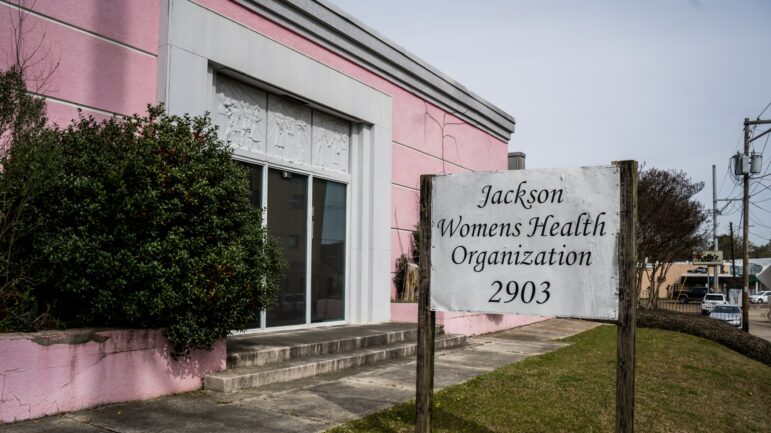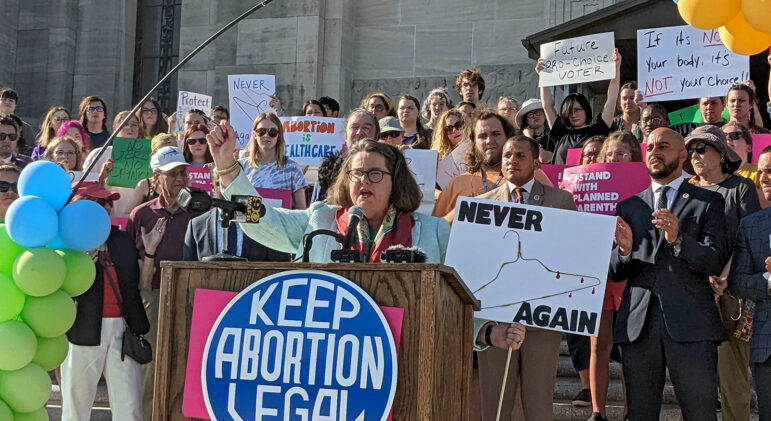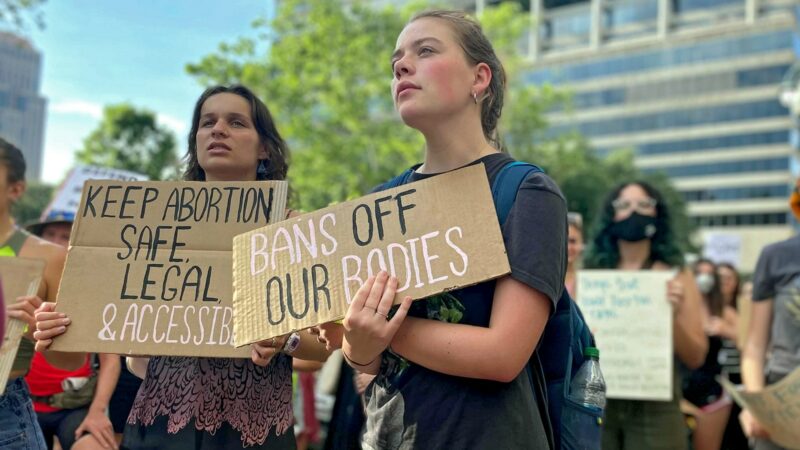A day after SCOTUS leak, Gulf States begin to prep for a future without Roe v. Wade
Two unidentified women hold up signs supporting abortion rights at a rally held outside of the U.S. 5th Circuit Court of Appeals courthouse in downtown New Orleans, May 3, 2022. The rally was held in response to a report from Politico that leaked an initial draft of a Supreme Court majority opinion striking down Roe v. Wade.
The Jackson Women’s Health Organization was quiet on Tuesday morning.
The only people moving about in the clinic’s parking lot were a small group of volunteers known as the Pink House Defenders, who help escort women from their cars to the clinic doors to curtail harassment.
The calm scene in the morning wouldn’t seem abnormal if not for the events that transpired the previous evening. Monday night, the nation went into a frenzy when a Politico report leaked an initial draft of a Supreme Court majority opinion that would strike down Roe v. Wade in a decision that would rule in favor of Mississippi in its case attempting to ban most abortions after 15 weeks of pregnancy.
Chief Justice John Roberts on Tuesday confirmed the authenticity of the draft and ordered an investigation into the source of the leak.
Derenda Hancock, one of the volunteers with the Pink House Defenders, said the news of the leak left her and other abortion-rights advocates feeling numb, but not surprised.
“Feelings — don’t have any,” Hancock said. “Even when you’re prepared for this, when you hear it, it’s just pretty much gut-wrenching.”

Preparing for an overturn of Roe v. Wade
While nothing officially changes until the court delivers its final decision in Dobbs v. Jackson Women’s Health Organization — expected to happen sometime in late June or early July — advocates on both sides of the issue are preparing for an end to legal abortion.
Abortion-rights opponents, like Omarr Peters, are cautiously optimistic.
Peters, the southern regional coordinator for Students for Life of America, was outside the Pink House handing out cards with Students for Life of America. He called the leak of the draft opinion a travesty, but was encouraged by the likely Supreme Court ruling.
“I am a pro-life male. I’m an African-American. And I just want to see us do better as a community … when it comes to life,” Peters said. “I believe life begins at conception, and it stays until natural death.”
Many Southern states have some legislation in place that would go into effect immediately. Alabama has a pre-Roe ban on abortion that was never removed, and the state’s lawmakers also passed further restrictions in recent years, so nearly all abortions would be outlawed there if Roe were overturned. Mississippi also has a pre-Roe ban on abortion still in effect and, along with Louisiana, has a trigger law in place.
The three states are also likely to implement more laws to vastly limit abortion access, along with 20 other states — mostly in the South.
Abortion-rights activists gathered in cities across the country Tuesday evening to protest the anticipated decision. In New Orleans, the scene was much louder than at the Pink House, as hundreds gathered outside the U.S. 5th Circuit Court of Appeals courthouse near Lafayette Square.
Protesters chanted phrases such as "Hands off our bodies!" during the rally, which featured several guest speakers, including Amy Irvin, a co-founder of the New Orleans Abortion Fund — one of several groups raising money to support people seeking abortions.
"The clinics have always struggled to provide care not only because of demand but because of the lack of providers," Irvin said. "Unfortunately, there's no real pipeline for new providers in this state."
A slightly smaller gathering of protesters — around 70 activists and other members of the public — took place at the steps of the State Capitol in Baton Rouge, chanting “never again” and carrying signs with glued-on coat hangers. Only a handful of state lawmakers were present, mostly the more progressive Democrats out of the New Orleans area who are the rare supporters of abortion rights.
Melissa Flournoy, a co-founder of 10,000 Women Louisiana and chairwoman of the Coalition for Louisiana Progress, noted that abortion is still legal and available in Louisiana — for the time being.
"Now it's time for women and men of good faith to rise up to protect the right to safe and legal abortion," Flournoy said. "Today is the first day for a longer strategy for Louisiana and women across the country saying enough is enough. We will not go back."
But Flournoy is unlikely to find many allies in the state capitol beyond the handful of lawmakers gathered with her. Sweeping abortion restrictions cleared the Louisiana legislature with broad support among Democrats, and the most extreme measures to pass in recent years were sponsored by Democratic lawmakers. Gov. John Bel Edwards, also a Democrat, signed off on those bills and has touted his ironclad anti-abortion rights record during his time in office.
Louisiana advocates are worried the Supreme Court’s decision would trigger a 2006 state law that would ban all abortions, even for rape or incest. Abortions would only be allowed to prevent the death of the mother or for a serious medical issue.
Right now in #neworleans, chanting downtown at the court of appeals. pic.twitter.com/WDh0VEagvr
— Shalina Chatlani (@chatlanis) May 3, 2022
Laurie Bertram Roberts, the co-founder of the Mississippi Reproductive Freedom Fund and executive director of the Yellowhammer Fund in Alabama, said even though the organizations were prepared for a decision that could overturn Roe v. Wade, the leaked draft left her stunned by its “blatant disregard for any pregnant person’s humanity.”
If the leaked documents prove to be true, Bertram Roberts said it would mean thousands of people in the Gulf South would be severely limited in their ability to get an abortion and other types of pregnancy care. Those most affected would be people who are low-income and are Black, Latino or indigenous.
“This isn't a coincidence. They want a whole corridor that's free from legal abortion,” Bertram Roberts said. “From Texas to the coast, [there’s] going to be people who have to drive to D.C., or … to Illinois or Minnesota. A lot of people do not have cars or reliable transportation that can travel more than 30 or 40 miles.”
What lies ahead for clinics and care
While the potential ruling would overturn Roe v. Wade, the impact it would have on most abortion clinics is still unclear.
Bertram Roberts said she plans to keep her own clinic, The West Alabama Women's Center in Tuscaloosa, open. Others might shut down entirely, or may try to pivot to different types of care.
Diane Derzis, the CEO of Jackson Women’s Health Organization, said the Mississippi clinic would stop performing abortions and instead switch to being a phone center for other Pink House operations in other states — like a planned Pink House in New Mexico set to open next month — that would see Mississippi patients.

Texas is already grappling with new abortion restrictions stemming from the Supreme Court decision’s to uphold the state’s “fetal heartbeat bill” — which bans abortions as early as six weeks. Dr. Bhavik Kumar, medical director at Planned Parenthood Gulf Coast, said on a press call that the Houston clinic has already had to turn away patients and the staff is limited in how many abortions they can perform under the ban.
Like other advocates on the call, Kumar emphasized that abortions are still legal, and the clinic is still trying to direct people to care.
Some abortion-rights advocates argue that as politicians fight to make abortion illegal, they are failing to execute a “pro-life agenda” in other policy areas.
“What I'd like to see is states like Mississippi who continue the Medicaid funding after a woman gives birth,” Derzis said.
There was bipartisan support for a Mississippi law that would extend postpartum Medicaid coverage for new moms from two months to a full year. The Republican Speaker of the House, Phillip Gunn, killed the legislation. Surrounding states, like Alabama and Louisiana, have instead passed bills with overwhelming bipartisan support.
“We don't care about [children] when they arrive in this world,” said Derzis. “It's only while they're in utero that we pretend to have such empathy for them.”
Gulf States Newsroom reporters Brittany Brown and Shalina Chatlani, Baton Rouge Public Radio reporter Paul Bruan and New Orleans Public Radio digital editor Katelyn Umholtz contributed to this report.
This story was produced by the Gulf States Newsroom, a collaboration among Mississippi Public Broadcasting, WBHM in Alabama and WWNO and WRKF in Louisiana and NPR.
Why haven’t Kansas and Alabama — among other holdouts — expanded access to Medicaid?
Only 10 states have not joined the federal program that expands Medicaid to people who are still in the "coverage gap" for health care
Once praised, settlement to help sickened BP oil spill workers leaves most with nearly nothing
Thousands of ordinary people who helped clean up after the 2010 BP oil spill in the Gulf of Mexico say they got sick. A court settlement was supposed to help compensate them, but it hasn’t turned out as expected.
Q&A: How harm reduction can help mitigate the opioid crisis
Maia Szalavitz discusses harm reduction's effectiveness against drug addiction, how punitive policies can hurt people who need pain medication and more.
The Gulf States Newsroom is hiring a Community Engagement Producer
The Gulf States Newsroom is seeking a curious, creative and collaborative professional to work with our regional team to build up engaged journalism efforts.
Gambling bills face uncertain future in the Alabama legislature
This year looked to be different for lottery and gambling legislation, which has fallen short for years in the Alabama legislature. But this week, with only a handful of meeting days left, competing House and Senate proposals were sent to a conference committee to work out differences.
Alabama’s racial, ethnic health disparities are ‘more severe’ than other states, report says
Data from the Commonwealth Fund show that the quality of care people receive and their health outcomes worsened because of the COVID-19 pandemic.








